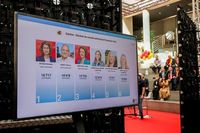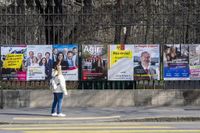On March 23, 2025, residents of the 45 communes within the Canton of Geneva participated in an important democratic exercise, casting their votes in the first round of municipal elections. These elections aim to install members into the Municipal and Administrative Councils, retaining authority over local governance for the next five years. Results reveal a pivotal transition within the political landscape of Geneva, as both the structure and character of municipal governance seem set for a dramatic change.
As of noon on election day, the polls closed and counting commenced, with results expected later that afternoon. The excitement lay not just in the outcomes but in the significant political stakes involved. The elections serve as a barometer for party strengths ahead of upcoming cantonal and federal elections, hence the focus on local alliances, especially between traditional parties like the PLR and emerging forces such as Ensemble à Gauche.
Provisional results show Christina Kistos of the Socialist Party leading with 16,717 votes, needing just 18,371 for an absolute majority that could see her elected in the first round. Following her are Alfonso Gomez from the Greens at 14,418 votes and Joëlle Bertossa, also a Socialist, at 13,732 votes. In fourth, the centrist Marie Barbey-Chappuis has 12,419 votes, narrowly followed by fellow Green candidate Marjorie de Chastonay at 12,411 votes, and Natacha Buffet-Desfayes from the PLR, who is in sixth place with 10,964 votes.
This first round marks a troubling turn for the Green party, which is projected to lose seven of its seats in the city council, dropping from 18 to just 11, a reflection of shifting voter sentiments and increasing competition from both center-right and right-wing parties. As reported by Le Temps, the left coalition, encompassing the Socialists and Green parties, now has 37 seats compared to 43 for the combined right-wing forces of the PLR, the Centre-Vert'libéraux, the MCG, and the UDC.
The UDC has shown a rejuvenated performance, with candidate Vincent Schaller earning nearly 2,000 more votes than in the previous election, signaling potential growth for right-wing influence in future governance. Per Mauro Poggia of the MCG, “The MCG is the only party addressing employment issues and listening to the concerns of Genevans.” Still, he expressed concern about the low voter turnout, emphasizing, “Without strong personalities in town halls, administrations will govern.”
Looking ahead to the second round on April 13, candidates must not only solidify their positions but also consider strategic alliances with other parties that could sway crucial votes and seats. In particular, the ongoing negotiations among center-right factions may shape the outcome remarkably, as traditional alliances are tested against newer parties.
In Vernier, the socialists faced a tight race with Martin Staub leading but still lacking the majority, meaning his seat must be contested again. With increasing competition, the dynamics in places like Vernier reflect larger trends throughout the canton, where the traditional leftist stronghold is appearing more fragile.
The changing landscapes extend to various communes, where local issues such as housing, environmental policy, and fiscal strategy play crucial roles on voters’ minds. The evolving demographics and socioeconomic factors are reshaping the valleys of Geneva, long regarded for their dependency on political cohorts from the left. However, with the PLR asserting itself strongly this year, backed by the support of its base, it aims to reclaim influence lost over the years.
The UDC, meanwhile, has strategically capitalized on growing discontent with the current political establishment and actively engages with voters to bolster its presence in local councils. Vincent Schaller comments, “This incredible score is promising for the municipal council results,” highlighting a revitalized agenda that seems to resonate well among constituents. This indicates not only a shift in votes but a tectonic movement in long-held political allegiances.
In places like Céligny and Thônex, results emerge indicating shifting loyalties and conditions for future electoral contests. Céligny has confirmed a second round for its Administrative Council, where Sabine Chassot Leiglon stands out with an absolute majority, guiding future policy discussions. However, for the traditional left in municipalities like Onex, where they have lost outright majority control, the party experiences a serious challenge to reclaim influence, facing losses as the Centre coalition regains previously lost seats.
The re-election efforts during this cycle could provide intriguing insights as Geneva has seen heightened political engagement from youth and activists alike, calling for not just preservation but progressive change. Voter turnout is often reflective of these evolving dynamics, and though preliminary turnout statistics show a slight decline, expectations remain that more engaged citizens can turn the tide in favor of their preferred candidates.
As the city navigates through this first electoral round and approaches an essential second round of contests, the outcomes will have a lasting impact on the governance of Geneva and will potentially influence broader political trends across Switzerland. With strategic campaigning, electioneering, and pivotal alliances forming, the civic engagement of the populace is becoming increasingly decisive in shaping the future of their communes.




